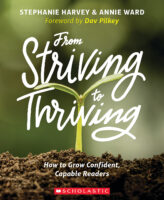Every Child a Super Reader
7 Strengths to Open a World of Possible
By Pam Allyn and Ernest Morrell
Every Child a Super Reader
10 Fundamental Principles for Developing Super Readers
The super reader is powered by sheer joy, by a feeling of belonging to a reading community, by his/her own strengths, and by an understanding of the power of those strengths. They are empathic and understanding high-achievers.
As teachers, administrators, and community service providers who care about children and their futures, we know how much reading matters. Communication is central to how we function in our society. Our innovations in technology, transportation, education, and business stem from the desire to connect individuals to one another with more efficiency and effectiveness. At the heart of communication lies literacy, the skill that makes it all possible.
Voluminous readers develop extensive vocabularies, navigate different assortments of text with ease, acquire analytical problem-solving skills, understand how reading works, and understand how writing works.
Ten principles undergird the development of super readers:
1. Super readers learn to read by reading interactively.
2. Super readers have a strong foundation in oral language.
3. Super readers understand that reading and writing are mutually beneficial language processes.
4. Super readers read broadly and deeply for authentic purposes.
5. Super readers have access to many kinds of texts.
6. Super readers need the freedom to make choices about what they read.
7. Super readers need “reading role models.”
8. Super readers thrive in a collaborative community of readers where they can share and hear what someone is thinking about a text.
9. Super readers develop the strengths and skills to read by spending time reading independently.
10. Super readers are joyful readers.
To develop super readers, we need to offer children “surround sound” reading. We need to give them the time and space to read like a super reader every day of the week, every week of the month, every month of the year, in school and out of school. By focusing on their strengths, we help them build a super reading life.
All children can and should be empowered by reading because reading is, by its very nature, empowering. To find out how you can empower your students and make Every Child a Super Reader, explore the book here.
About the authors of this post:
Pam Allyn
Pam Allyn is the Executive Director and founder of LitWorld, a global organization advocating for children’s rights as readers, writers, and learners. She is also the Executive Director and founder of LitLife, a national organization dedicated to school improvement. Ms. Allyn is widely known as a motivational speaker advocating for reading and writing as human rights that belong to all people. She is the co-author of Every Child a Super Reader (Scholastic) and the summer reading program LitCamp.
Ernest Morrell
An award-winning author, teacher, and researcher, Ernest Morrell is the Coyle Professor of Literacy Education and the Inaugural Director of the Center for Literacy Education at the University of Notre Dame.
7 Strengths for Educators
By Pam Allyn and Ernest Morrell
We know, that like the super reader, the super teacher is powered by an unwavering belief in the child. As you build on children’s strengths and immerse them in an intellectually invigorating, emotionally nurturing, literature-rich community, you are developing avid super readers who consume texts with passion, understanding, and a critical eye. The work you are doing is vital, important, and will build the foundation for your students' futures.
We have a 7 Strengths-inspired wish for you, educators, to send you on your way:
Belonging: That you will have the privilege of belonging to the world of educators who believe in all children as super readers and to the community of children who are becoming those readers.
Curiosity: That you will be inspired by children’s curiosity and that you will be fueled by their extraordinary questions that will lead us to a better world.
Friendship: That you deepen relationships both with the children you serve and the adults with whom you work, coming closer in understanding each other through reading.
Kindness: That you will experience the power of kindness through the characters you meet in literature and through the actions you and your super readers take to make the world more beautiful.
Confidence: That you will have the confidence to learn and grow in your work and that you will inspire that same confidence in the growing super readers in your lives.
Courage: That you will have courage, on a day that feels hard, to try again and again, and that you will be fearless and resolved to work through the challenging aspects of creating a world of super readers.
Hope: That you dream big dreams, that your literacy legacy will be eternal, that you cultivate dreamers and doers among your super readers that make the world a better place, and that through the work you do, we are all changed.
We are proud of the work you are doing.
To learn more about the 7 Strengths upon which these wishes are built and how to make Every Child a Super Reader, explore the book here.


